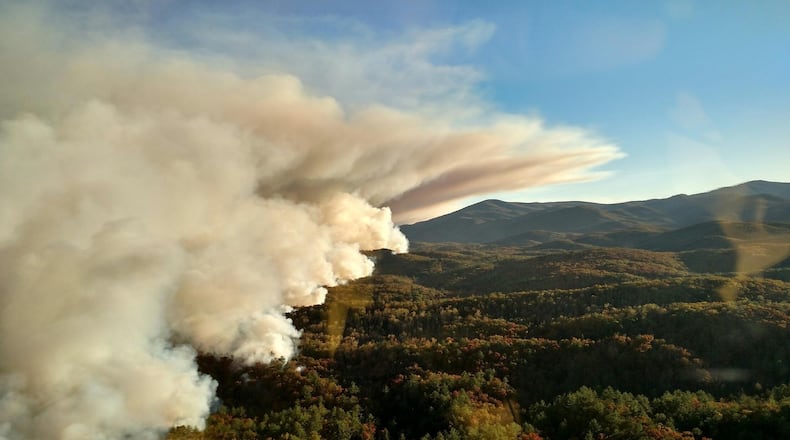More than 25,000 acres of North Georgia was on fire late Monday — three separate fires that sent a smokey haze over metro Atlanta and as far south as Macon. For those closest to the fires, each day is a smoke-filled waiting game that the blazes will be extinguished without damaging any homes.
“All we can do is hope that the winds stay down until this thing can burn itself out,” Wyndle Bates, an Epworth resident, told The Atlanta Journal-Constitution.
Bates lives within 3 miles of the largest of three fires, the Rough Ridge Fire in Fannin County, and said his 64 acres should be safe. There are no trees within at least 100 feet of his home, keeping it safe from a potential forest fire. But he and his wife have been unable to avoid the thick smoke, heavier some days than others depending on which direction the wind blows.
“It’s very, very annoying,” Bates said Monday. “It gets into your home, your clothes smell, your home stinks.”
Wildfires continued to spread in Rabun, Fannin and Dade counties, where some evacuations were in place. It could take weeks to extinguish the fires, and with no rain in sight the danger for more fires persists, federal and state experts said.
"In the northern metro counties where the drought is exceptional, the potential is there for fires to ignite," Wendy Burnett of the Georgia Forestry Commission said. "The drought is continuing to deepen and expand, so we're seeing more fires in the other parts of the state."
Since Friday morning, the agency has responded to 183 wildfires throughout the state, Burnett said, though most have been small and quickly extinguished. But those fires are only the ones on state-owned or private property.
In Rabun and Fannin counties, two major fires in the Chattahoochee-Oconee National Forest occurred on federal land, where crews from as far away as Alaska, California and Arizona continued efforts Monday to control the flames.
The Rough Ridge Fire was burning 19,411 acres Monday morning and was 20 percent contained, according to officials. Crews planned to continue "strategic firing," or forcing the fire to continue to rivers to allow nature to quell the flames, which were sparked by lightning.
In Rabun County, the Rock Mountain Fire burned an area of 5,484 acres, forcing evacuations in the Plum Orchard community and the Coleman River/Nichols Branch Road areas. Residents in Tate City, in neighboring Towns County, were also being evacuated. Investigators believe humans may be responsible for the Rock Mountain blaze, which remains under investigation.
Sixty homes have been evacuated in Dade County, where approximately 1,200 acres burned Monday afternoon, Burnett said. That fire may also have been sparked by people rather than nature, she said.
“Most of them are human-caused, but most are not intentionally caused,” Burnett said.
Monday afternoon, the U.S. Department of Homeland Security's Federal Emergency Management Agency authorized federal funds to reimburse costs to Georgia to fight the Tatum Gulf Fire burning in Dade. This authorization makes FEMA funds available to pay 75 percent of the eligible firefighting costs, such as labor, equipment and supplies, as well as costs for emergency work such as evacuations and sheltering, police barricading and traffic control.
Though the North Georgia fires remained at least 100 miles from metro Atlanta, winds continued to push smoke south. However, no new wildfires were reported around metro Atlanta on Monday.
In Cherokee County, crews have responded to 35 calls reporting wildfires since late last week, according to Tim Cavender, fire department spokesman. There were no active fires Monday afternoon.
“The biggest thing is people are calling about the smoke,” Cavender said. “We’re telling people, ‘Don’t do any type of outdoor burning whatsoever.’”
The air quality was worsening throughout the day Monday in Atlanta, according to Air Now, which monitors the conditions. A red alert was in place Monday afternoon, meaning everyone was advised to reduce time outdoors.
Many, like Bates, are hopeful that much-needed rain will come soon. But it has been weeks since the area has seen any significant precipitation.
“Up until midsummer, we had record rainfall here,” Bates said. “It’s like someone shut the spigot off.”
About the Author
Keep Reading
The Latest
Featured


